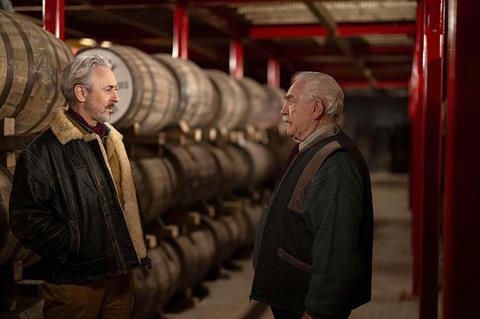
Film and high-end television (HETV) production spend in the UK hit £5.6bn in 2024, with film production reaching £2.1bn, an increase of 56% on 2023.
The £5.6bn figure doesn’t match the 2022 record of £6.3bn, but is a 31% increase on the Hollywood strike-addled 2023, according to statistics released by the British Film Institute (BFI) today (February 6).
High-end TV production accounted for the lion’s share of the overall spend, reaching almost £3.4bn, an increase of 20% on 2023 and the third highest annual spend since tax relief was introduced in 2013, and 62% of the total spend.
This £3.4bn spend on HETV includes £511m from 25 film productions made for streaming platforms, which fall under the HETV tax credit. To qualify for the film tax credit, productions need to decide at the outset whether they are intended for theatrical distribution.
Inward investment and co-production spend on film and HETV in the UK reached £4.8bn, representing 86% of the total spend.
UK local film production spend is £186m, a 24% increase on 2023, and 9% of the total spend on film. Inward investment films contributed £1.9bn (87% of total film spend), a 78% increase on 2023. Co-production spend accounted for £79.8m (4% of total film spend), a 51% decrease on 2023.
The total number of films that went into production in the UK in 2024 was 191 which is 16 fewer than reported for 2023. Among the homegrown productions to shoot in 2024 were Nadia Latif’s The Man In My Basement, Anthony Maras’ Pressure and Brian Cox’s Glenrothan.
Inward investment
UK produced films that have been classified as inward investment and that have contributed to the spend include Yorgos Lanthimos’ Bugonia, Danny Boyle’s 28 Years Later, Michael Morris’s Bridget Jones: Mad About The Boy, and Gurinder Chadha’s Christmas Karma. (The BFI explained it had classifed UK filmmaker Chadha’s film as inward investment, owing to the involvement of US production company Maven Screen Media and financing from the US and India, as well as the UK not having a co-production treaty with the US.)
Overall, the BFI qualifies an inward investment production as a project which is substantially financed and controlled from outside the UK, where the production is attracted to the UK because of script requirements, the UK’s infrastructure, or UK tax reliefs. Many (but not all) inward productions are classifed UK films, HETV programmes or animation programmes by virtue of their UK cultural content and the fact that they pass the cultural test administered by the BFI certification unit.
The 29 UK and international co-productions included Marc Turtletaub’s UK-Belgium-Netherlands feature Borges And Me.
In 2024, 65% of total UK production spend on film was accounted for by productions from the five major US studios (Disney, Universal, Sony Pictures, Paramount and Warner Bros) and the three major US steaming platforms (Netflix, Apple and Amazon), also representing a 49% increase in spend in 2024 versus 2023.
UK production spend in 2024 by non-US studio or streamer films (UK and non-studio inward investment independent productions) was £751.9m. This represents 34% of total UK film production spend. This is up from 2023, when UK production spend by non-US studio or streamer films was £653.2m.
HETV

UK local HETV production spend remains much higher than film, at £598m, or 17% of total HETV production. This represents a 22% decrease on 2023. Inward investment shows contributed £2.8bn (82% of total HETV spend), a 36% increase on 2023. Co-production spend was £19.6m (less than 1% of total spend), a 50% decrease on 2023.
HETV counts as minimum core expenditure of £1m per broadcast hour.
Inward investment HETV productions included Netflix’s Peaky Blinders film The Immortal Man, The Donovans, Young Sherlock, Man vs Baby and Art Detectives. Domestic HETV productions included Gavin & Stacey: The Finale, Inheritance, Transaction and Man Like Mobeen.
HETV co-productions included Ten Pound Poms, Austin and Professor T.
“The UK’s film and TV industries continue to be a powerhouse for creativity, investment and jobs,” said Ben Roberts, BFI chief executive. “After a disrupted 2023, including the impact of US strikes, production spend rebounded to £5.6bn in 2024 – up 31% on the previous year – demonstrating the UK’s strength as a world-leading destination for filmmaking.”
However, he continued: “At the same time, we know these figures don’t tell the whole story. The 22% drop in domestic HETV spend is a reminder that many in the industry are feeling the pressure, and what happens next will be critical. Continued investment in skills and infrastructure, alongside strong government support is essential to ensuring the UK remains a magnet for international productions while strengthening our independent sector for the future.”
Adrian Wootton, chief executive of the British Film Commission (BFC), added: “After a challenging 2023 due to US strikes, and a slower than expected return to production, these figures reflect the increased inward investment film and HETV production activity we saw in the UK as 2024 gathered pace. So we see 2024 as a transitional year.
“Looking forward, we’re cautiously optimistic. The British Film Commission is experiencing the highest level of inward investment production enquiries for many years. And while we’re still waiting for the market to settle, to reach a ‘new normal’, we have strong support from UK government, new and enhanced tax credits – including an increased VFX tax credit and the all-new credit for independent films – a world-class skills base and a UK-wide offer of diverse locations and stage space boasting cutting edge facilities.
“The UK remains well-placed to see a competitive share of the global production spend and all signs are that we’ll see strong growth in film and HETV in coming months.”

























No comments yet